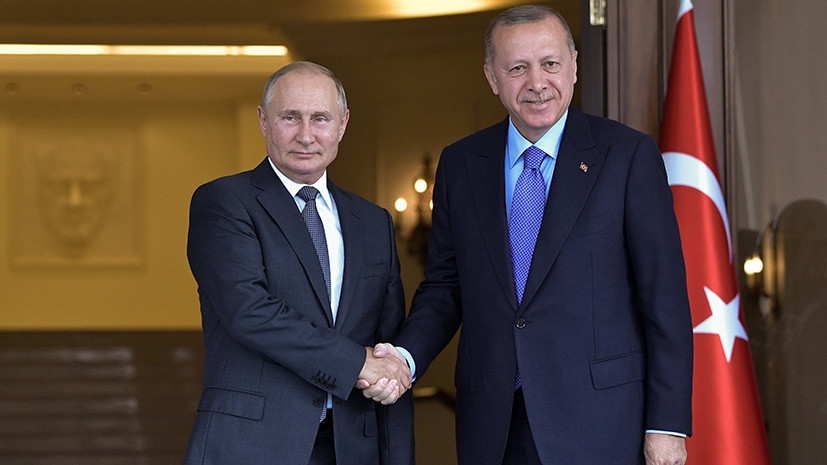Moscow and Ankara signed an agreement on settlements and payments in national currencies. This was reported by the press service of the Ministry of Finance of Russia.
It is noted that the document is aimed at expanding and strengthening interbank cooperation, as well as ensuring uninterrupted payments between business entities of Russia and Turkey.
On the Russian side, the agreement was signed by First Deputy Prime Minister and Minister of Finance Anton Siluanov, and on the Turkish side by the Minister of Treasury and Finance Berat Albayrak.
“The main goal of the preparation of the document is to increase and gradually switch to the use of national currencies (ruble and lira) for settlements between the two countries, create the appropriate financial market infrastructure and increase the attractiveness of national currencies for business entities,” the Ministry of Finance said in an official statement site.
In addition, the agreement provides for the further expansion of the infrastructure for accepting Mir cards in Turkey and the connection of Turkish banks and companies to the financial message transfer system (SPFS), the Russian analogue of SWIFT.
“The signing of the agreement is an important step for the further expansion and development of mutually beneficial and equitable trade and economic cooperation between Russia and Turkey,” the Ministry of Finance said in a statement.
According to experts, the decision of the Russian and Turkish financial authorities is consistent with the long-declared rate of de-dollarizing the economy, including through the transition to settlements in national currencies.
“I think the main goal of this agreement is to reduce dependence on the US dollar and, in principle, on the American financial system in trade and investment relations between the two countries. Both Russia and Turkey are subject to American restrictions today, so using the US dollar in cross-border transactions is equally risky for both countries, ”explained Narek Avakyan, Head of BCS Broker Investment Department, RT.
The analyst emphasized that, in line with de-dollarization, Russia is also negotiating with India, China, and even in relations with the EU, the country is trying more and more to switch to settlements in euros.
“Such a measure will not increase the trade turnover between countries, but it will protect it from the influence of third parties, since the United States will no longer be able to block transactions in settlements in national currencies,” Avakyan concluded.
In a conversation with RT, Dmitry Alexandrov, the chief strategist at UNIVER Capital, also noted the impact of the transition to national currency settlements on trade. “As part of the transition to the calculation in national currencies, Turkey guaranteed concessions for entrepreneurs from Russia, which is an occasion to expand trade and increase the volume of supplies to Turkey, which will have a beneficial effect on the Russian economy,” the expert said.
- © Sputnik / Alexei Nikolsky / Kremlin via REUTERS
The Russian authorities have announced an active transition to settlements in national currencies with trading partners in 2018. In particular, Anton Siluanov announced the inclusion of this issue in the financial agenda. The head of the Ministry of Finance spoke about the preparation of a document with proposals on tax benefits for companies conducting operations in Russian currency. At the same time, the Minister of Finance added that de-dollarization will not affect the foreign currency accounts of Russians.
In addition, the head of the Ministry of Industry and Trade, Denis Manturov, said that the state is working on joint actions to phase out the US dollar with countries in Southeast Asia, the Middle East, Latin America and Africa. It is curious that the minister a year ago just touched on the topic of Russian-Turkish trade and did not rule out that the supply of components for the needs of the Russian automobile industry from Turkey could become a concrete example of such a currency transition.
In turn, the head of the Ministry of Energy Alexander Novak in July 2019 said that about a third of the settlements in Russian-Turkish mutual trade are carried out in national currencies.
Russia also intends to actively practice settlements in national currencies with China. So, President Vladimir Putin, after negotiations with Chinese President Xi Jinping, said that intergovernmental agreements had already been concluded aimed at further expanding the use of rubles and yuan in bilateral trade, as well as ensuring uninterrupted banking services for transactions in conditions of instability in global markets.
It is interesting that earlier in a conversation with RT, HSE Director of Economic Policy Yuri Simachev recalled that the discussion on the topic of diversification started back in the early 2000s, when it became clear that it was irrational to carry out the overwhelming majority of settlements in the currency of one country.
Then the gradual diversification of the Central Bank's reserves began, and by the end of 2018, the Central Bank halved the share of the US dollar in its international reserves - from 45.8% to 22.7%. At the same time, the share of the euro in the country's foreign exchange reserves increased almost one and a half times - from 21.7% to 31.7%, and the Chinese yuan - five times, from 2.8% to 14.2%.

